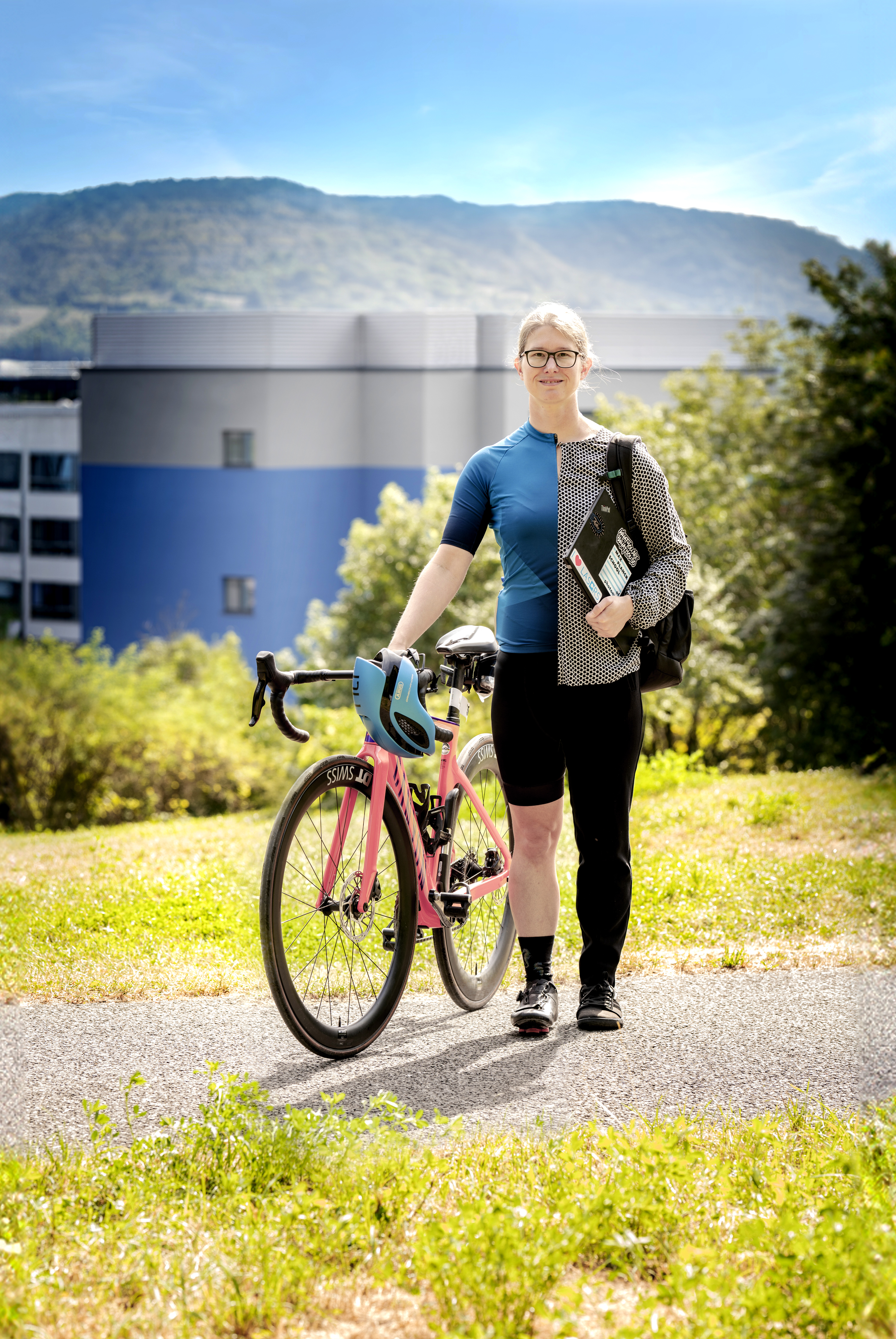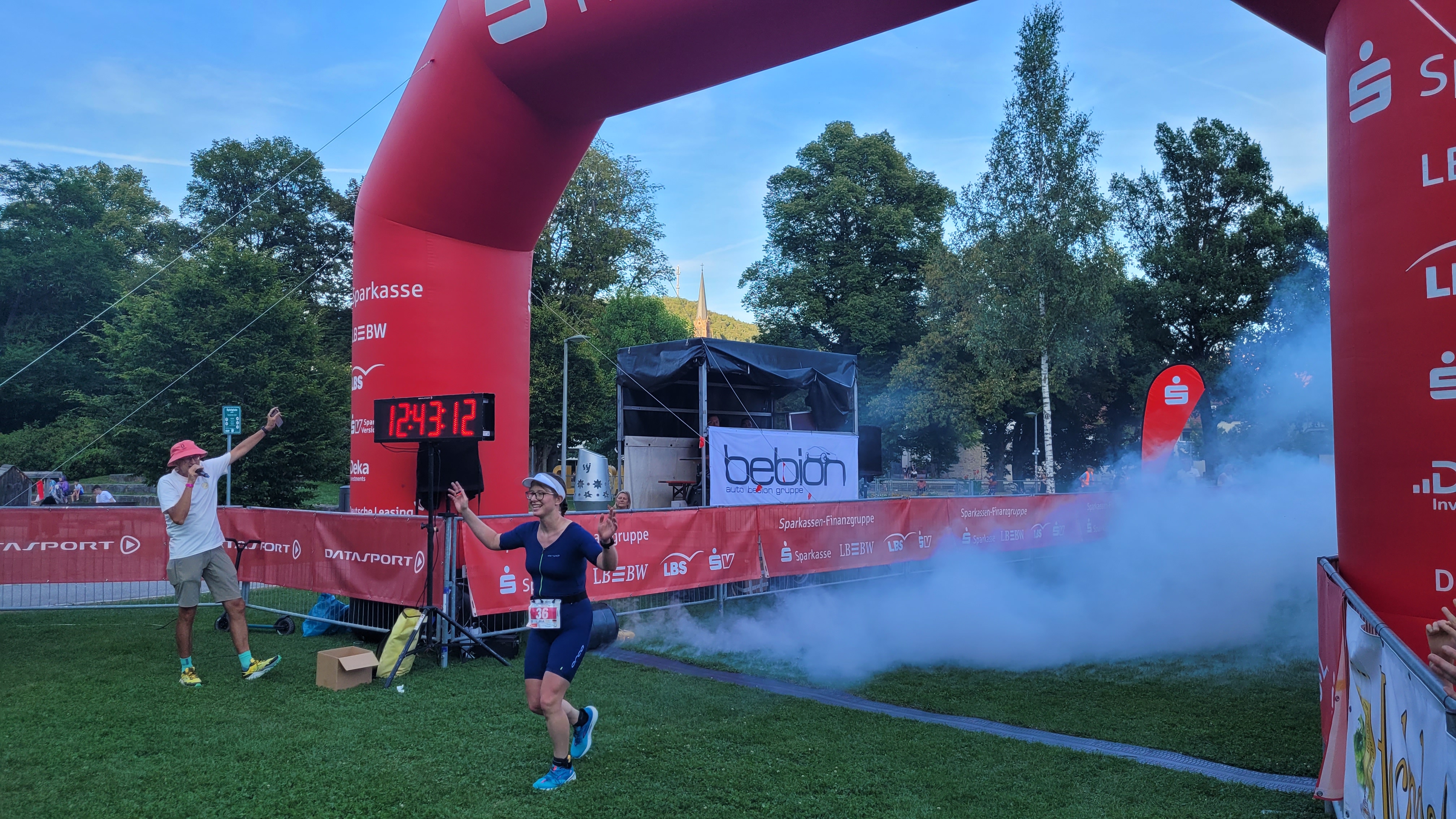Jena / September 17, 2024
On Ambition, Humility and Self-Efficacy
Dr. Julia Hengster successfully completes her second long-distance triathlon
"Keeping at it is everything," says Julia Hengster. The physicist with a PhD is a keen athlete and recently completed her second long-distance triathlon. She works at Fraunhofer IOF as a consultant for the institute's management and therefore knows only too well that an iron stamina is not only needed in sports, but also in everyday working life between funding applications and strategy development. What drives her is the joy of discovery - including her own limits.
When Julia Hengster came to Jena for the first time, she was sitting on a bicycle. "I was on a bike trip with a friend on the route connecting the biggest /most important cities of Thuringia the "Thuringian Chain of Cities" (Thüringer Städtekette) – a wonderful bike route," she remembers. That was in 2014, when she didn't know that the city on the Saale would become her new home only four years later. Today, she works in various roles on behalf of the Fraunhofer IOF institute management.
The bicycle that carried her to Jena back then still regularly takes her out into the world today. After all, Julia wants to discover it. And the best way to do that is in seven-mile stride: "I always want to know: What's around the next corner?" she says. With a wink, she adds: "And the fitter you are, the more you can discover."
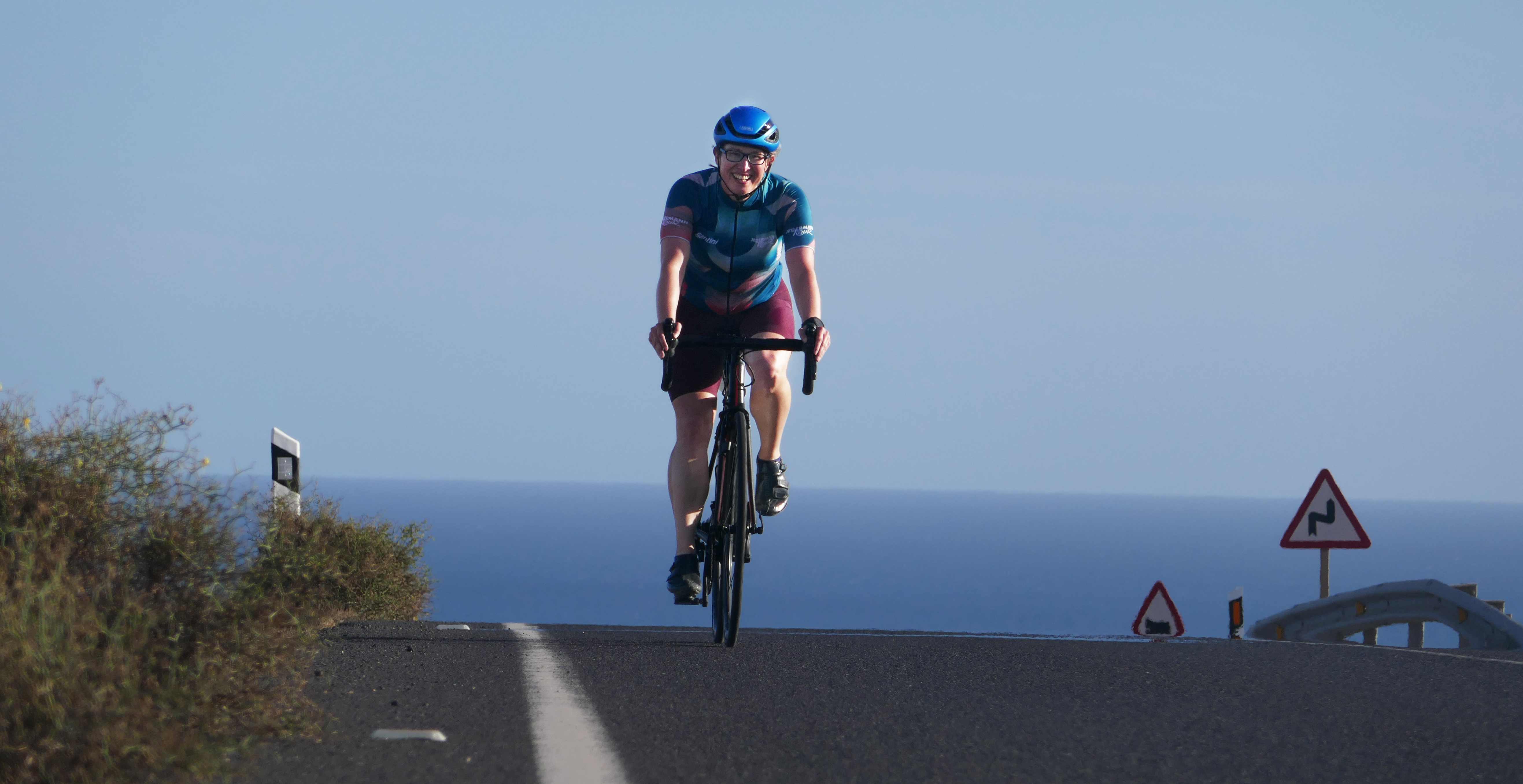
"It’s the discovery that excites me"
Fitness and sport are an important part of Julia's life. In August, the physicist with a PhD successfully completed her second long-distance triathlon. Put into numbers, this means swimming 3.8 kilometers, cycling 178 kilometers and running 42 kilometers. And all within 15 hours. For Julia, the triathlon in the Black Forest was the second of its kind. In 2022, she completed her first competition on a similar scale in Hanover. She can also look back on two successful triathlons in the middle distance.
But what drives people to achieve such outstanding athletic goals? There are certainly as many motives as there are athletes. Julia says of herself: "I've always been a sporty person. There's just something in me that wants to move and test my limits."
Julia has been searching for these limits since she was a child: At the age of eleven, she took part in a 24-hour swim and completed eight kilometers. As a young adult, she spent a lot of time on inline skates and took part in a 135-kilometer inline skate marathon along the river Rhine. After hearing these anecdotes, one might think that Julia likes to push herself to physical extremes. But she emphasizes: "It's the discovery that excites me. My focus is on getting as far as possible."
Self-efficacy through sport
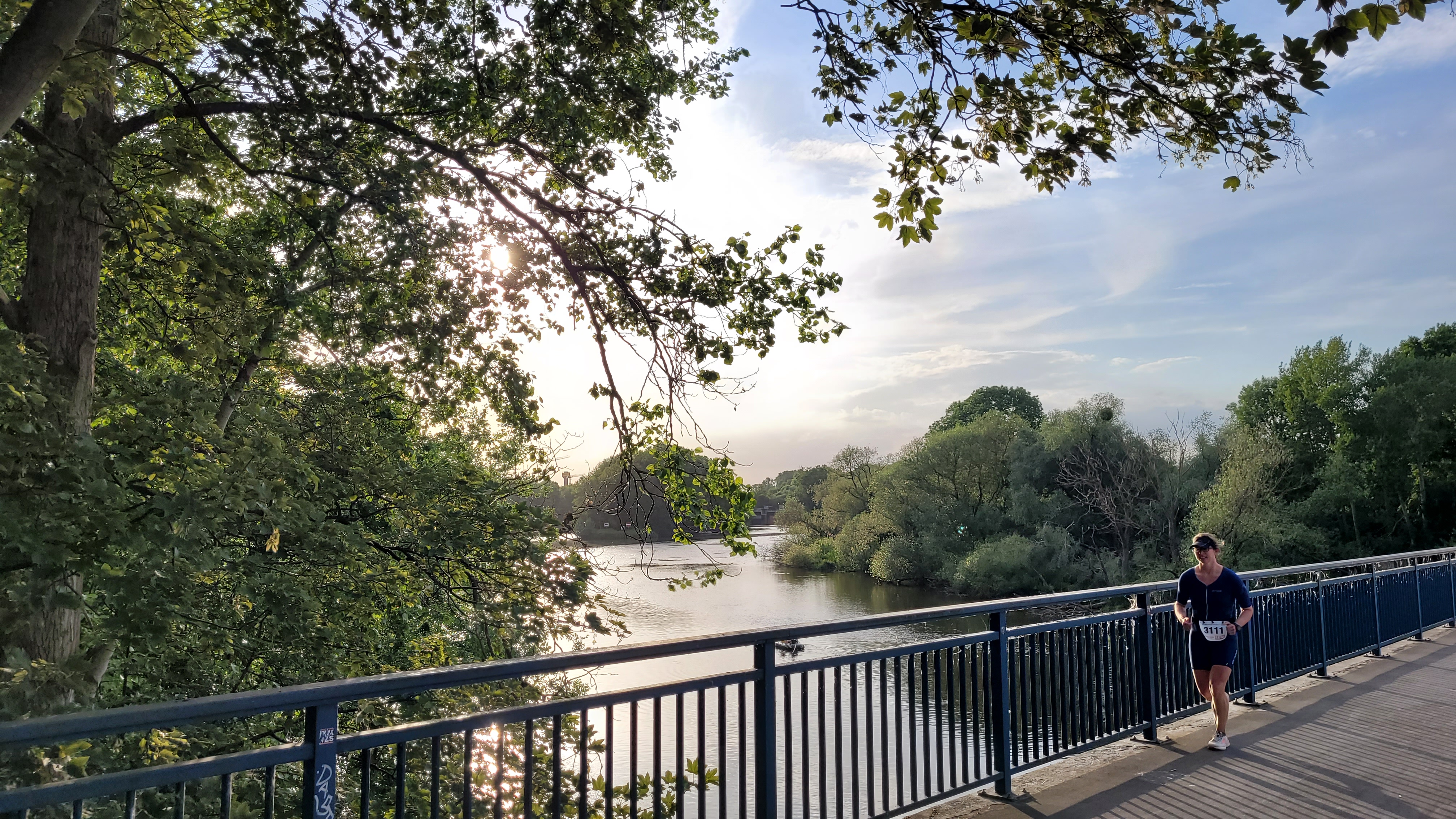
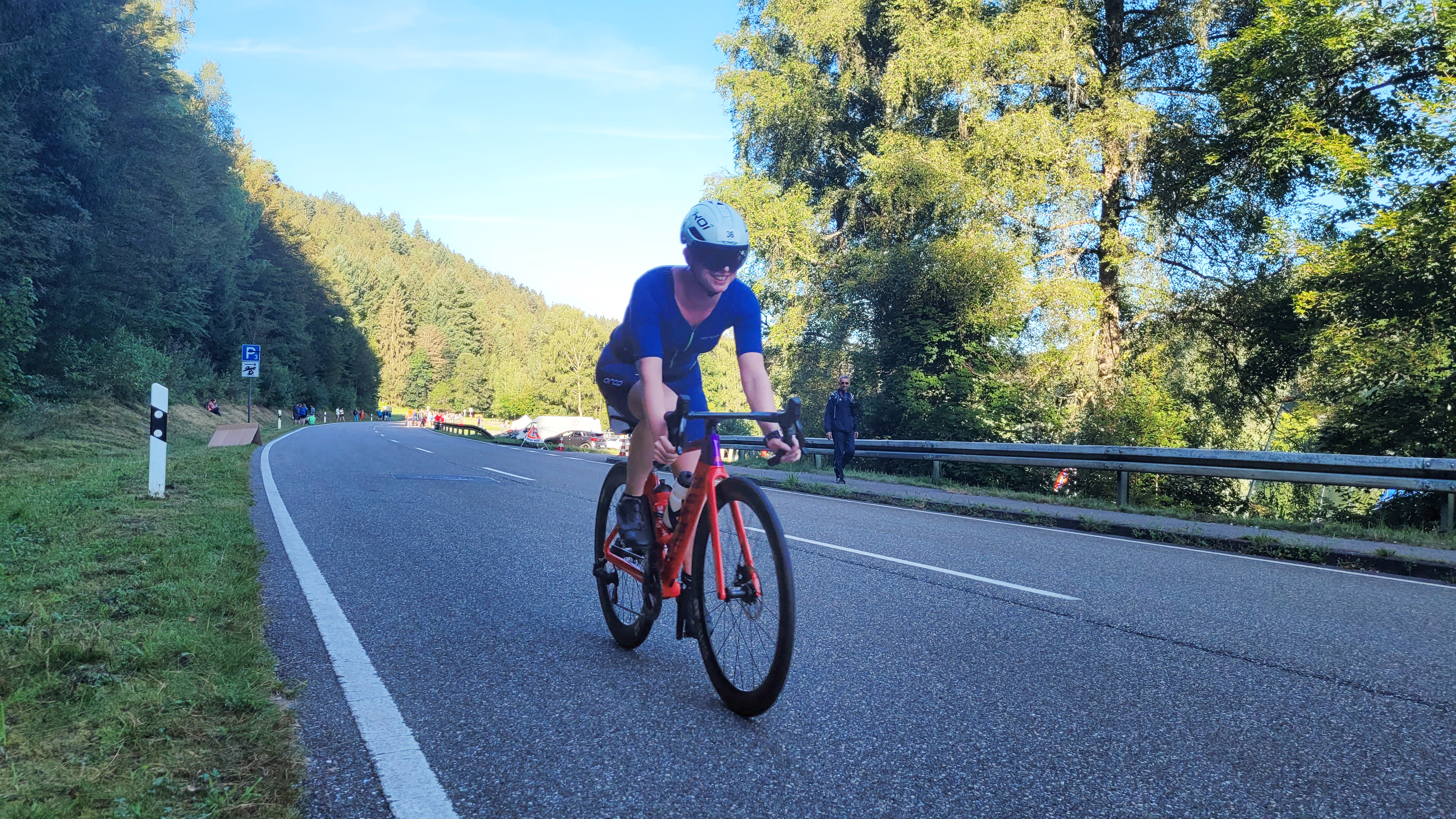
For Julia, the triathlon is both a goal and a means to an end. "With the competition in mind, I have a concrete goal that I can train for - that helps me to keep going," she says, demonstrating what it takes to master such an athletic challenge - tenacious endurance and consistent perseverance. "I'm always happy when I see progress in my performance. For example, when I can cycle up hills faster and better," she sums up. "That's also something that gives me a great sense of self-efficacy. I realize that I have a structured training plan that works if I stick to it. I am improving in a measurable way. That's a sense of achievement that I can be very happy about."
For women in particular, this self-efficacy still has a special significance. Long-distance competitions as well as physics and photonics are still heavily male-dominated. "As a woman, you shouldn't let yourself be held back and pursue your interests," says Julia. She adds: "When it comes to sports and careers, due to cultural reasons, men are often still more likely than women to find the time for intensive training or professional flexibility.Some interested women tend to have doubts in such an environment."
But everyone has the basic potential to improve their own performance, says Julia: "I'm convinced that everyone can improve. In everything. First and foremost, you have to practice. Then you will make progress. Everyone can and should decide for themselves what goals they set themselves. Every intermediate goal along the way helps you to progress. That’s how self-efficacy can build."
Max Planck School, consultant, site coordinator – "triathlon" at work
Practice. Keep at it. And discover the world, yourself and your own abilities and limits in the process. These are skills that Julia Hengster can put to good use both in sports as well as in her everyday working life. Originally from Karlsruhe, she has been working at Fraunhofer IOF since 2018. Since then, she has played a key role in establishing the Max Planck School of Photonics (MPSP). The MPSP is one of three pilot schools that emerged from a joint initiative of the major non-university research organizations - Max Planck, Fraunhofer, Leibniz and Helmholtz - as well as various universities. "In the beginning, there were three of us in the MPSP team in Jena,” recalls Julia. “We had a very well-equipped cost center and a vision of where we wanted to go."
The vision was an international study program for graduates in the fields of optics and photonics - a network of excellence for the most talented graduates. Since the MPSP was founded, around 40 young international researchers have already decided to continue their careers in the city of light Jena in the footsteps of optics pioneers Carl Zeiss and Ernst Abbe with the support of the program. Meanwhile, the team behind the success of the MPSP has grown to seven people in six years and continues to be led by Julia as coordinator. "Following this vision and building the program in such a way that it is highly valued by the participants is a great experience," she sums up.
Furthermore, Julia is a scientific coordinator to Andreas Tünnermann, the Director of theat Fraunhofer IOF. "My tasks include supporting the institute director's communication tasks. I am also involved in the institute's strategy development, for example by moderating between different parties and following up on the development status." A long-term and not always straightforward process. Most recently, she was also involved in coordinating the site management of the new Fraunhofer Research Center in Erfurt.
Interplay between ambition and humility
MPSP, consultant, site coordinator - Julia has basically been involved in a kind of triathlon professionally over the last few years. "You always have to keep at it and balance all roles," she says. "And you also have to learn to deal with setbacks or unexpected disruptions," she adds, and for a moment it's not quite clear whether she's talking about sports or her job. With regard to the triathlon, she specifies: "In the end, it's not always in your hands whether you actually make it to the finish line. No matter how well trained you are: If you have one or even several mishaps on the bike route or accidentally slip on a stone while running - then the competition is over. It's as simple as that."
The metaphor can be applied all too well to life, which is known to throw obstacles in your path from time to time. Ultimately, it is therefore always an interplay of ambition and humility, says Julia: "There are moments when you fail because of the system. In sport, it can be bad weather, at work it can be a strategy process or a funding decision that you have to wait longer than expected for. You're then slowed down against your will and have to exercise patience."
About patience and accidental sidekicks
In moments like these, it is important to observe the general conditions closely and analyze them well, says Julia. Here, too, the analogies between sports and work are close - especially with regard to the people who accompany you on these journeys: "When there's a water start in a triathlon, there are 40 or 50 people who all want to swim very close together at the same time. It can happen that you get hurt by an arm or a leg without any harm meant."
Such "sidekicks" are also familiar from the job, she says: "Here, we work in an organization where many people have lots of ideas and want to make great things happen. But you can't always do everything at once. So, you have to recognize that for yourself: Just because I want something particularly badly doesn't mean that everyone else around me has the same timeline or priority for my project." Patience with the system is needed here. "And above all, you have to recognize that the others are not doing this because they want to cause me harm, but often because they also have their own framework conditions that are derived from their roles or tasks."
"Keeping at it is everything."
And how does it feel when you cross the finish line despite perceived kicks and punches and perhaps a flat bike tube? "First of all, you're incredibly happy that you don't have to keep running," says Julia with a laughing sigh. "You're relieved and proud that you just made it. Arriving is the goal. And that you pace yourself to get there. If you exhaust yourself too quickly, want too much, you'll burn out and might not even make it to the end."
And there it is again: The bend from the beginning and what needs to be discovered behind it. And the self-efficacy that helps to motivate yourself and to keep going round the bend with iron perseverance in spite of possible resistance. Because no matter whether you're swimming, cycling or running a marathon between funding applications and everyday office life: "Keeping at it is everything," says the triathlete.
A passion for light - that is Fraunhofer IOF. Here, innovative solutions for light-based future technologies are developed. But who are the people behind the research and science? We introduce them in the series "Faces of Fraunhofer IOF".
